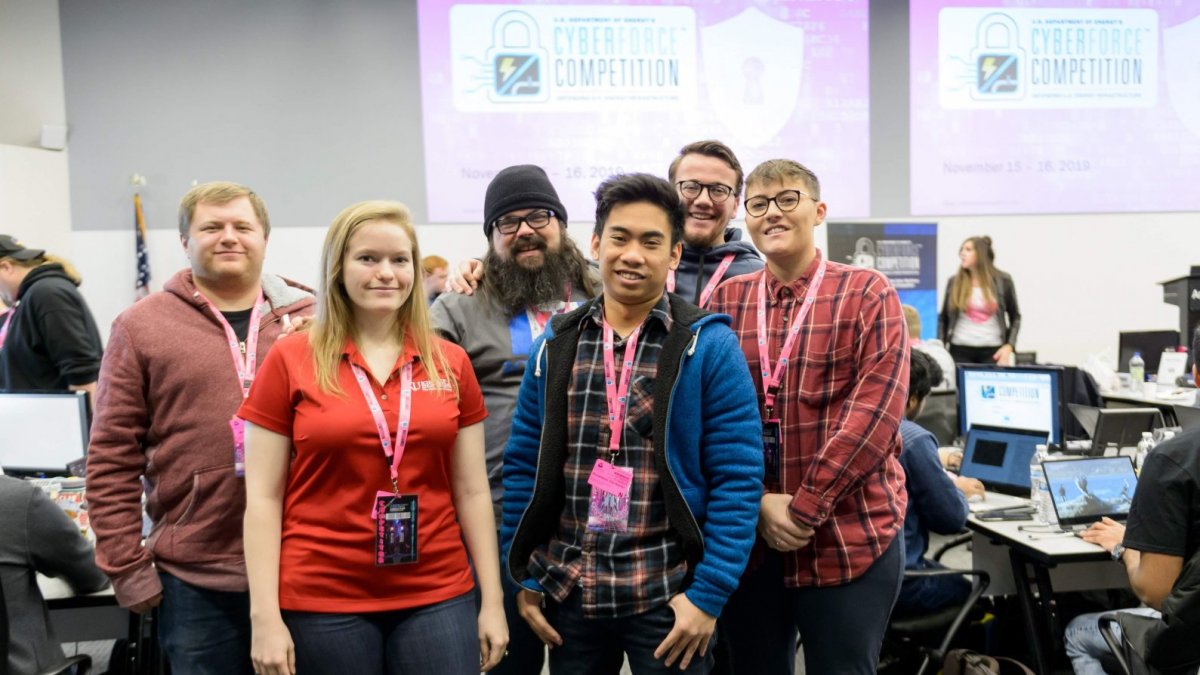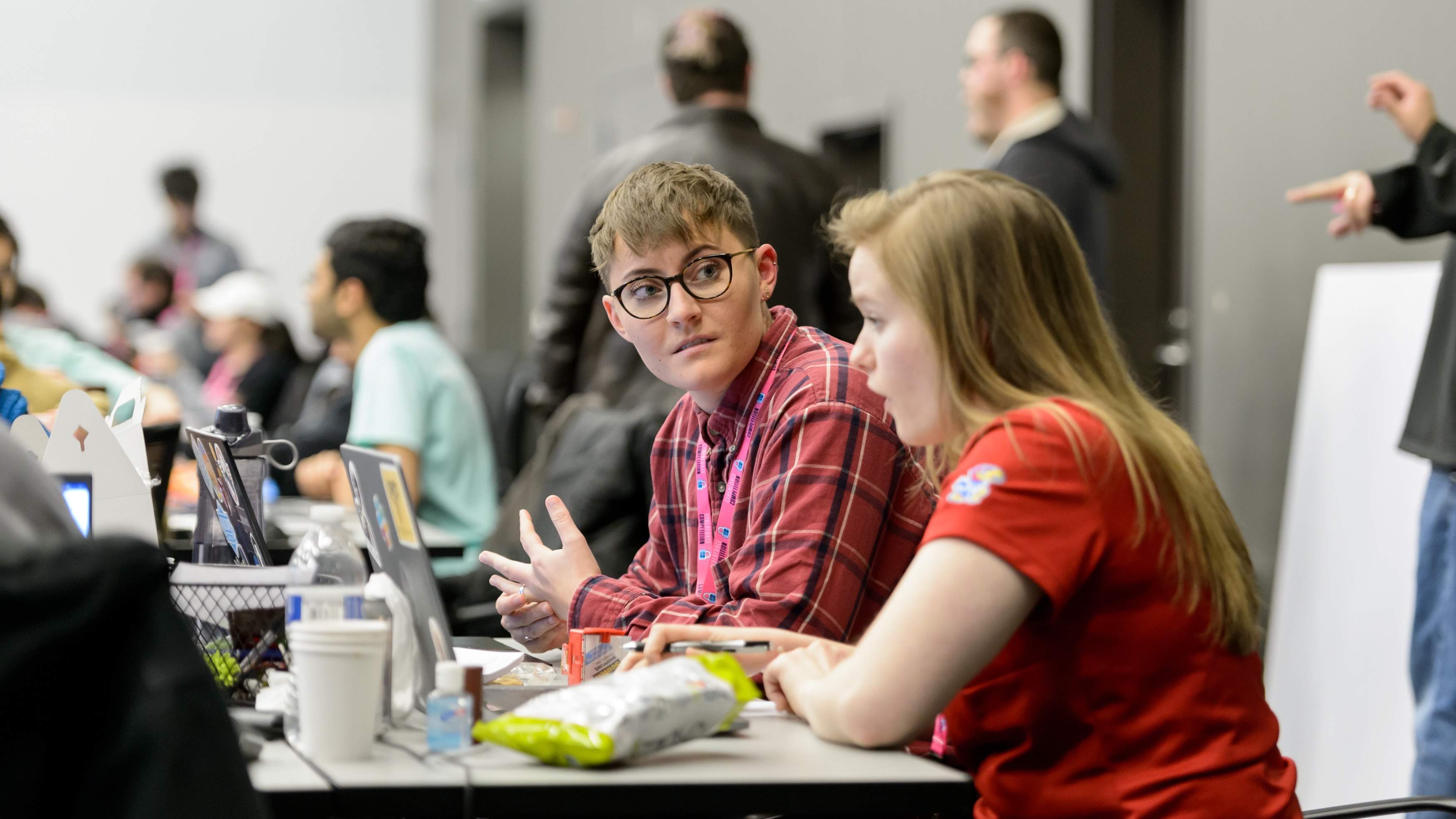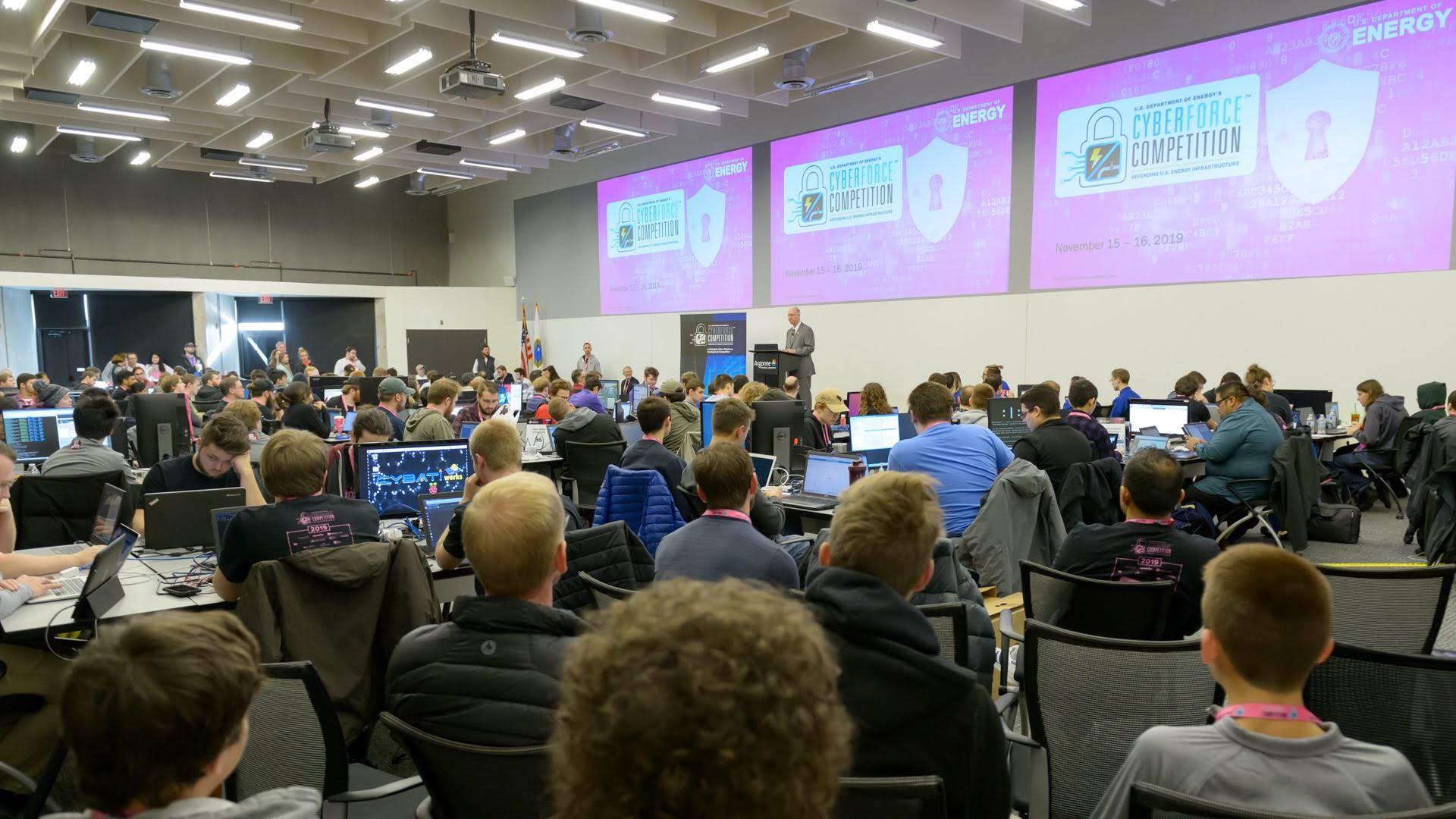Students showcase cyber defense skills at national CyberForce competition

Placing in the top 25 percent at a national U.S. Department of Energy (DOE) cybersecurity event out of 104 university teams nationwide may seem like a big deal. But according to Bachelor of Science in Information Technology (BSIT) students involved and their professors at the KU Edwards Campus, this level of success is not the most important outcome from the competition. While competing at high levels, students also developed skills like teamwork, time management, perseverance, critical thinking and other skills necessary for life success.

Being able to figure out what each team member knows and coordinating their efforts was very interesting,” said Madi Schulte, BSIT senior and co-captain of KU’s DOE CyberForce 2019 team. “It's also a little different when you do something IT security-related for a grade in a class versus when you can secure the system however you want to make it work and be a lot more creative in your solutions.”
Team co-captain and BSIT senior Hannah West agreed that the competition gave them hands-on experience in critical thinking and collaboration.
“You can learn so much and it puts you in a position where you have to learn because it's so fast-paced and challenging,” West said. “You learn about each other and have the chance to network with industry professionals who run the competitions.”
BSIT Director and Associate Professor of Practice Annette Tetmeyer, along with BSIT faculty member Chris Seasholtz, accompanied six KUEC students to Chicago to compete in the 5th annual Department of Energy CyberForce Competition at Argonne National Laboratory in November.
“When we talk to employers, they tell us hands-down the most important thing we can do for our graduates is to teach them the ability to learn,” Tetmeyer said. “Critical thinking, team building — the enterprise skills that everyone needs regardless of their job. So we give them opportunities that allow the development of those non-technical skills while also teaching the solid technology skills they need.”
There were 104 teams accepted to the national competition by ten DOE national laboratories throughout the country. Many more teams wanted to compete but did not make the cut, according to Tetmeyer. Seniors Cooper Mahring and Elly Richardson, junior Judson King, and graduate student Doug Van Allen joined Schulte and West on the team. All students are enrolled at KU Edwards Campus in either the bachelor’s or master’s program in information technology and are members of KU’s Information Security Club, the Jayhackers.
Schulte and West serve as president and vice president of the club, which is active at the Lawrence and Edwards campuses. They, along with Mahring, also recently organized and hosted their own cyber defense competition at the Edwards Campus as their capstone project. That event attracted high school and college teams, giving the organizers a look at the inner-workings of these competitions.
“We were able to apply the breadth of knowledge that we learned throughout the BSIT program into this one final deliverable,” Schulte said. “Besides the logistical tasks of organizing a competition, we had to design the systems with all of the bad stuff in there for participants to find and basically made it like an Easter egg hunt for all of the vulnerabilities the systems had.”
The critical thinking and problem-solving skills learned during their capstone project were useful at the CyberForce competition, according to West. She said the team spent months preparing for that competition and the dozens of other travel and virtual defense-related competitions they attend throughout the year.
“Our students are a really diverse group so we try to make sure that there are a broad range of competition opportunities because some of our students have families and jobs, and they can't necessarily take a couple of days to travel,” Tetmeyer said.

To prepare for typical cyber defense competitions, students put together vulnerable machines, secure them and try to break into them with the team. Seasholtz, who advises the Jayhackers club, said this competition provided different opportunities as well.
“It focused on anything energy-related with relation to the nation’s infrastructure, so things like electricity, solar, and wind that make this country run,” Seasholtz said. “So many of our infrastructure systems in use today were built without any or adequate security systems. Today’s professionals must figure out how to make those systems as secure as possible. At CyberForce, students were challenged with securing physical devices. That’s not something students get at any other event. We even got to bring the device home so we’re able to use it as a teaching model for our classes.”
Despite their success, Schulte said there were challenges. One difficulty was finding time for the team members to prepare.
“Time when we can all get together is difficult to find because we’re kind of all over,” she said. “I think there's maybe one person on the team that doesn't have at least a part-time job, so it’s difficult to coordinate around that.”
West said they met the challenge head-on by communicating virtually and sending surveys to determine group time availability.
“All of these students are juggling school, work, club activities, career searches and everything else in their personal lives,” Tetmeyer said. “I do not know when they find time to sleep! They are truly motivated and amazing in their efforts!”
Schulte is originally from Wichita, Kansas, and works at KU Medical Center’s Office of Information Security. She has attended KU all four years. West, who earned three associate degrees from Johnson County Community College before enrolling in KUEC’s BSIT program, lives in her hometown of Gardner, Kansas, and is also working part-time at Cerner as a software engineer.
Despite the challenges, Tetmeyer said she and Seasholtz have a “hands-off” policy when it comes to helping the competition teams.
“We consider this a learning experience for our students,” Tetmeyer said. “Some universities offer a competition class where they have designated time and college credit to prepare for events like this. Our students are doing their prep on top of their other classes and work schedules. There are many teams that have a lot of resources and are told exactly what to do. We let them learn, make decisions and sometimes fall flat. Then pick themselves back up. Our goal is for them to learn and not for us to tell them everything.”
One of the original Johnson County Education Research Triangle (JCERT) programs, the information technology program began at KUEC in 2012 and has consistently grown every year, according to Tetmeyer.
“It's growing and becoming more diverse,” she said. “We’re seeing more traditional and non-traditional students. Many of our students are coming from community colleges. We’re seeing more women and more veterans.”

Tetmeyer said information technology does crossover with computer science programs “but where we differ is that computer science is more theoretical, while information technology is more applied with a wide range of career opportunities in systems, security, web and more.”
A new report out from Cybersecurity Ventures estimates there will be 3.5 million unfilled cybersecurity jobs by 2021, up from 1 million openings last year. This equals a total of 350 percent growth in open cybersecurity positions from 2013 to 2021. Tetmeyer said KUEC is working to provide trained graduates to fill those jobs — whether through the bachelor’s or master’s degrees in information technology or graduate certificates in software engineering and management or cybersecurity.
“Even if our students aren’t taking a position that is specifically called ‘cybersecurity,’ it’s going to be integrated into everything we do,” Tetmeyer said.
The BSIT program is part of KU’s Electrical Engineering and Computer Science Department (EECS). All of the undergraduate programs in the School of Engineering, including BSIT, are ABET-accredited. ABET accredits college and university programs in the disciplines of applied and natural sciences, computing, engineering and engineering technology at the associate’s, bachelor’s and master’s degree levels.
At the CyberForce competition, students and BSIT faculty also toured Argonne National Laboratory facilities, the local host for 24 of the teams competing around the nation. The tour included the facility’s Advanced Photon Source, datacenter, and visualization lab. Argonne Director Paul Kearns spoke with the team at the start of the competition. Jayhackers team members representing the KU Women in Computing met with the program manager under Karen Evans, DOE Assistant Secretary for Cybersecurity, Energy Security, and Emergency Response (CESER), to discuss cybersecurity careers in government and opportunities for alumni participation in future competitions.
“Overall, the event was a fantastic opportunity for students which we cannot replicate with classroom experiences,” Tetmeyer said.
Top Photo: KU’s CyberForce 2019 competition team consisted of Cooper Mahring, Madi Schulte, Doug Van Allen, Elly Richardson, Jud King and Hannah West. They are all students at KU Edwards Campus in the BSIT or MSIT programs and placed in the top 25 percent of teams in the nation at the annual security systems competition in Chicago.
Find out more about the Bachelor of Science in Information Technology, the Master of Science in Information Technology and the masters of IT or cybersecurity at KU Edwards Campus.
About the Jayhackers Club: Also called Information Security Club, Jayhackers hold bi-weekly meetings that include discussions on the information security field, presentations by industry speakers, and informative/practical labs on defending and attacking security systems. They also compete in and host Cyber Defense Competitions virtually and in other cities.





